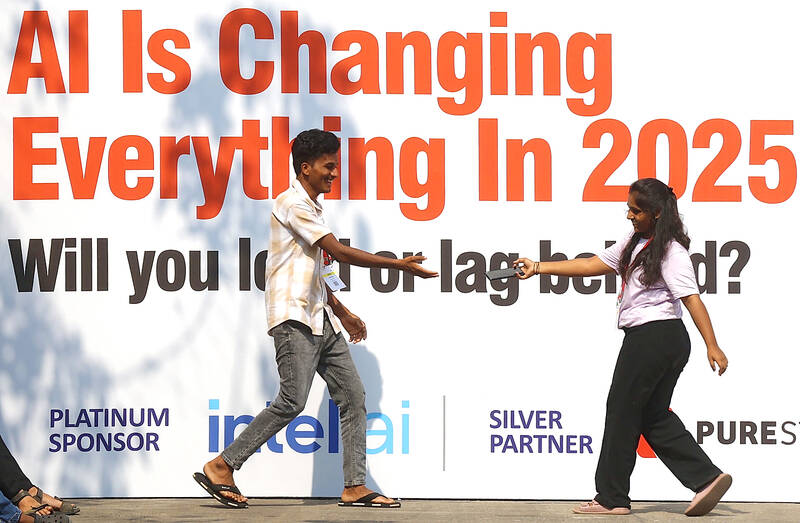“Stop Hiring Humans” read a provocative sign at an AI conference in Las Vegas, where the impact of new artificial intelligence models on the world of work had sparked some unease.
“We’re not worried about tiptoeing around. We’re sparking the conversation,” said Fahad Alam of Artisan, a startup, at the HumanX AI event.
The San Francisco company is promoting AI agents — virtual sales representatives that identify potential customers, contact them, write emails and schedule appointments.

Photo EPA-EFE
AI agents, which are supposed to make decisions that are usually made by humans, have become the latest buzzword of the generative AI story that began with the release of ChatGPT in 2022.
With its offering, Artisan’s typical avatar, Ava, costs 96 percent less than a human performing the same tasks, according to the company’s Web site.
The startup’s straight-to-the-point approach sharply contrasts with most generative AI companies, who tread cautiously on whether ChatGPT-like technologies will leave human workers unemployed by the wayside.
“I don’t fundamentally think it’s about displacing employees as much as better leveraging them for the things only humans can do,” said Josh Constine of SignalFire, a venture capital firm.
Predictions can vary wildly. Goldman Sachs estimates AI could eliminate 300 million jobs globally through automation.
An Metrigy report last year found 89 percent of firms surveyed reduced customer relations staff in the previous year due to generative AI.
On the other hand, 70 percent of major companies surveyed by the World Economic Forum said they planned to hire workers with AI-related skills in the coming years.
“It’s natural evolution,” said Joe Murphy of D-iD, which offers video avatars and recently struck a partnership with Microsoft. “Like the car’s invention, AI will create a new sector. Jobs will be created and lost simultaneously.”
Supporting this theory, data from the US Department of Labor shows jobs for secretaries and administrative assistants fell from 4.1 million to 3.4 million between 1992 and 2023, coinciding with the rise of office computing.
During the same period, the number of computer scientists more than doubled, from approximately 500,000 to 1.2 million.
Still, given the sensitivities about replacing humans, some advise discretion.
“You’re selling software that replaces a significant part of their team,” said Tomasz Tunguz, founder of Theory Ventures. “You can’t sell that overtly.”
“Some clients candidly don’t want it known they’re using AI,” added Alam.
‘INEVITABLE’
There is little doubt that some kind of upheaval of the workplace is underway, but its precise impact remains uncertain.
Analysts predict job losses for programmers, call center operators, translators and travel agents.
However, others caution against taking bold statements — or reassurances — by startups at face value.
“Technology innovators learn communication skills by overstating the positive, underplaying the negative,” said Mark Hass, marketing professor at Arizona State University.
But many startups reject the notion they’re misleading on job impacts.
“The majority of people we’re talking to aren’t doing this because of efficiency. They’re doing this because of top-line revenue growth,” said Paloma Ochi of Decagon, a marketing AI startup. “And when the business grows, that’s good for everyone. There are going to be more jobs for humans within that business.”
“Most customers don’t want to let people go,” said Joshua Rumsey, a senior sales engineer at Aisera, whose AI agents are used in finance and HR. Though they are “looking to grow without hiring new agents as existing ones leave.”
Given the disruptions, Hass advocated for greater transparency, warning that surprising the public with negative impacts on livelihoods could lead to backlash.
“Talking about the implications doesn’t weaken the case for AI, because I think it’s inevitable. Not talking about it in a wholesome way creates the opportunity for misunderstanding,” he said.

Last week the story of the giant illegal crater dug in Kaohsiung’s Meinong District (美濃) emerged into the public consciousness. The site was used for sand and gravel extraction, and then filled with construction waste. Locals referred to it sardonically as the “Meinong Grand Canyon,” according to media reports, because it was 2 hectares in length and 10 meters deep. The land involved included both state-owned and local farm land. Local media said that the site had generated NT$300 million in profits, against fines of a few million and the loss of some excavators. OFFICIAL CORRUPTION? The site had been seized

Next week, candidates will officially register to run for chair of the Chinese Nationalist Party (KMT). By the end of Friday, we will know who has registered for the Oct. 18 election. The number of declared candidates has been fluctuating daily. Some candidates registering may be disqualified, so the final list may be in flux for weeks. The list of likely candidates ranges from deep blue to deeper blue to deepest blue, bordering on red (pro-Chinese Communist Party, CCP). Unless current Chairman Eric Chu (朱立倫) can be convinced to run for re-election, the party looks likely to shift towards more hardline

Sept. 15 to Sept. 21 A Bhutanese princess caught at Taoyuan Airport with 22 rhino horns — worth about NT$31 million today — might have been just another curious front-page story. But the Sept. 17, 1993 incident came at a sensitive moment. Taiwan, dubbed “Die-wan” by the British conservationist group Environmental Investigation Agency (EIA), was under international fire for being a major hub for rhino horn. Just 10 days earlier, US secretary of the interior Bruce Babbitt had recommended sanctions against Taiwan for its “failure to end its participation in rhinoceros horn trade.” Even though Taiwan had restricted imports since 1985 and enacted

The depressing numbers continue to pile up, like casualty lists after a lost battle. This week, after the government announced the 19th straight month of population decline, the Ministry of the Interior said that Taiwan is expected to lose 6.67 million workers in two waves of retirement over the next 15 years. According to the Ministry of Labor (MOL), Taiwan has a workforce of 11.6 million (as of July). The over-15 population was 20.244 million last year. EARLY RETIREMENT Early retirement is going to make these waves a tsunami. According to the Directorate General of Budget Accounting and Statistics (DGBAS), the